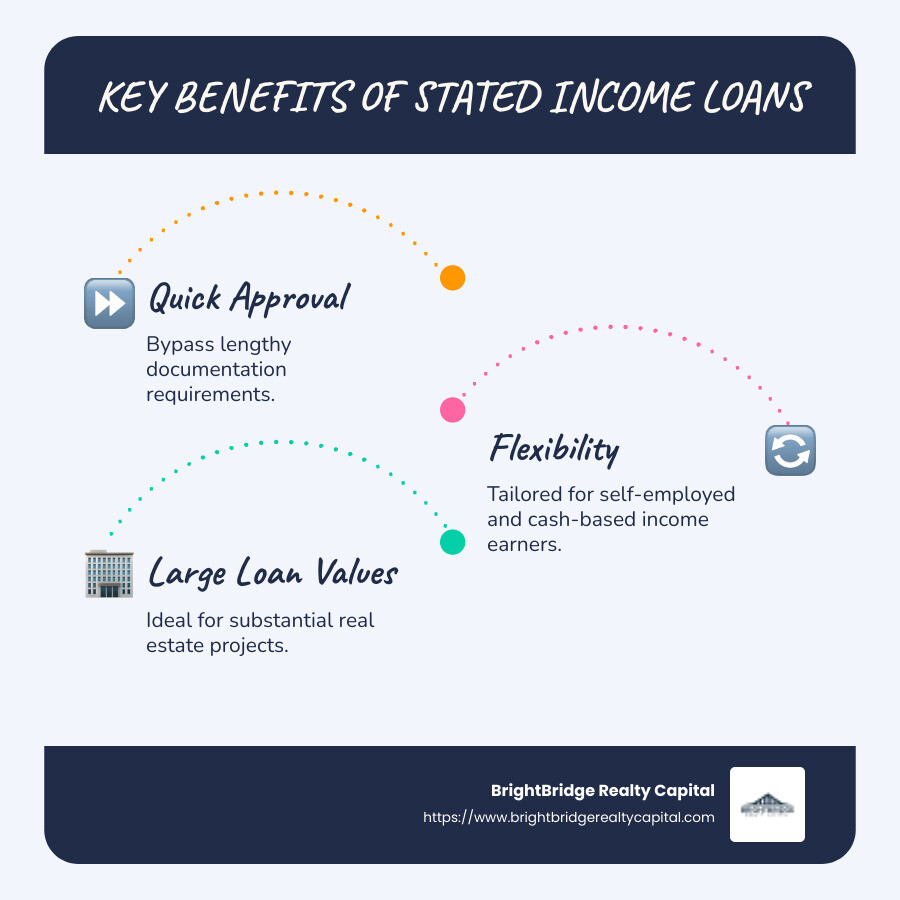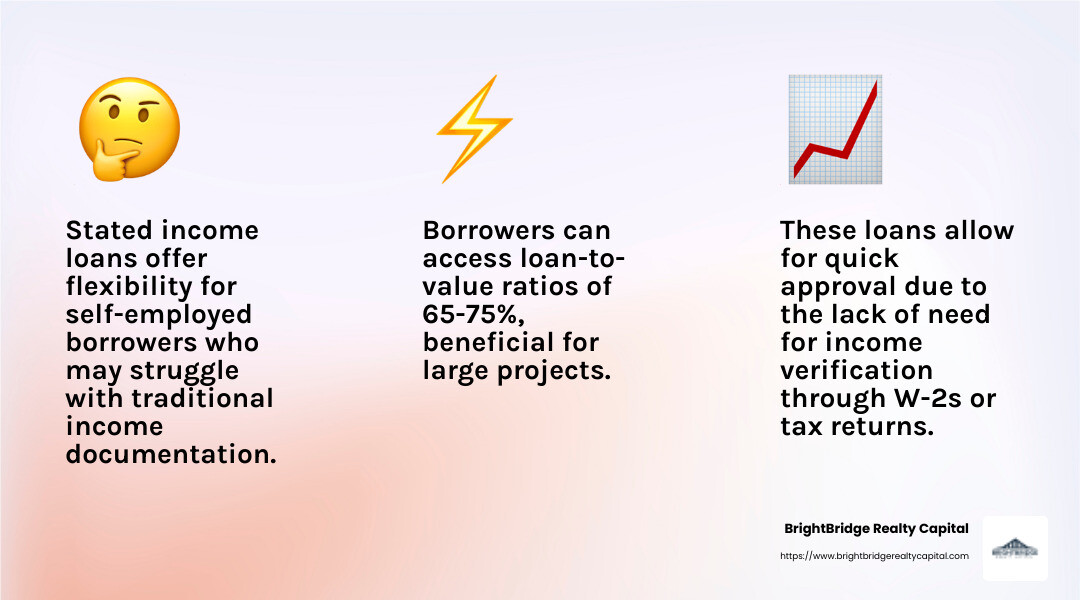Stated Income Real Estate Loans in New York: A Comprehensive Guide

Stated income real estate loans new york offer a flexible financing option custom for real estate investors, especially in the busy New York market. These loans allow borrowers to qualify for funding without traditional income verification methods like W-2s or tax returns. Instead, approvals hinge on other factors such as credit score and property value.
For investors seeking agility and speed in their financial dealings, the key benefits of stated income loans include:
- Quick approval process: Bypass lengthy documentation requirements.
- Flexibility: Custom for self-employed and cash-based income earners.
- Large potential loan values: Ideal for substantial real estate projects.
The New York real estate market presents unique opportunities and challenges. Stated income loans can offer a practical solution for investors needing fast, efficient access to capital to seize on these opportunities.

Understanding Stated Income Real Estate Loans
Benefits of Stated Income Loans
Stated income real estate loans open doors for many who might struggle with traditional lending requirements. Here's why these loans are particularly beneficial:
Flexibility for Self-Employed Borrowers: Traditional loans often require extensive documentation of income, which can be challenging for freelancers, contractors, and other self-employed individuals. Stated income loans allow these borrowers to qualify based on their stated earnings rather than documented income, making it easier to secure financing.
Quick Approval Process: With no need to verify income through W-2s or tax returns, the approval process is significantly faster. This is crucial in competitive markets like New York, where speed can make the difference in securing a property.
Diverse Borrower Profiles: These loans cater to a wide range of borrowers, including those with cash-based incomes, such as taxi drivers and waiters, who might not have traditional income documentation.
Loan-to-Value Ratios: Typically, stated income loans offer loan-to-value ratios between 65-75%, allowing borrowers to access substantial funds relative to the property's value. This can be especially beneficial for large real estate projects.
Risks and Considerations
While stated income loans offer several benefits, potential borrowers should be aware of the associated risks:
Fraud Potential: The nature of stated income loans, which rely on self-reported income, can lead to fraudulent applications. It's crucial for both lenders and borrowers to ensure all information is accurate and truthful.
Higher Interest Rates: Due to the increased risk for lenders, stated income loans often come with higher interest rates compared to traditional loans. Borrowers should weigh this cost against the benefits of quick and flexible financing.
Regulatory Scrutiny: These loans have faced increased scrutiny due to past abuses and the financial crisis of 2008. Borrowers should ensure they work with reputable lenders who adhere to current regulations and best practices.

In summary, stated income real estate loans in New York provide a valuable option for many, but they require careful consideration of both their benefits and risks. Understanding these aspects can help borrowers make informed decisions and successfully steer the lending landscape.
Stated Income Real Estate Loans in New York
Eligibility Criteria
In New York, stated income real estate loans are making a comeback after being sidelined for years. These loans are especially appealing to self-employed individuals and those with non-traditional income streams. But what does it take to qualify?
Credit Score: A minimum credit score of 600 is typically required. While this is lower than many traditional loans, it reflects the lender's willingness to take on more risk.
Down Payment: Borrowers should be prepared to make a significant down payment. Loan-to-value ratios are generally between 65-75%, meaning you might need to cover 25-35% of the property's value upfront. This assures the lender of your commitment and reduces their risk.
Asset Verification: While income verification isn't required, lenders will often look at your assets. This includes savings, investments, or other tangible assets that can demonstrate financial stability. Having a solid asset base can strengthen your application.
Application Process
The process for securing a stated income real estate loan is streamlined compared to traditional loans, but it's important to understand each step:
Loan Application: Start by completing a loan application. Be accurate and truthful in stating your income, as this forms the basis of the loan. Overstating income can lead to fraud charges.
Underwriting: Once your application is submitted, it goes to the underwriter. The underwriter assesses your credit score, down payment, and asset verification. They also evaluate the property's value and its potential to generate income, especially for investment properties.
Funding Process: If approved, the loan moves to the funding stage. Here, the lender disburses the loan amount, allowing you to complete the purchase or refinance. This step is typically faster than traditional loans, thanks to the reduced documentation requirements.
Navigating the stated income real estate loan market in New York requires understanding these criteria and processes. With the right preparation, you can secure financing that aligns with your financial profile and real estate goals.
Alternatives to Stated Income Loans
While stated income real estate loans offer flexibility, they're not the only option available in New York. Here are some alternatives:
Traditional Mortgages
Traditional mortgages are the most common type of home loan. They require full income verification, which means you'll need to provide tax returns, W-2s, or pay stubs. These loans usually offer lower interest rates compared to stated income loans. However, the application process is more rigorous and can take longer due to the extensive documentation required.
Bank Statement Loans
Bank statement loans are a great choice for self-employed individuals who have difficulty proving their income through traditional means. Instead of tax returns, lenders use your bank statements to assess your income. Typically, you'll need to provide 12 to 24 months of statements. This option offers more flexibility than traditional mortgages and can be a good middle ground if you don't qualify for a stated income loan.
Asset Depletion Loans
Asset depletion loans allow you to qualify based on your assets rather than your income. Lenders calculate a hypothetical income by dividing your total liquid assets by a set number of months, usually 360. This type of loan is ideal for retirees or individuals with substantial savings but little to no regular income. It offers a unique way to leverage your financial resources without relying on employment income.
Each of these alternatives has its own set of requirements and benefits. It's essential to evaluate your financial situation and goals to determine which loan type best suits your needs. Whether you're self-employed, have significant assets, or prefer a traditional approach, there's likely a mortgage solution that fits your profile.
Frequently Asked Questions about Stated Income Real Estate Loans
Are stated income loans still available in New York?
Yes, stated income real estate loans are still available in New York, although they are not as common as they once were. These loans are particularly useful for self-employed individuals or those with income sources that are difficult to verify through traditional means. Lenders offering these loans have become more cautious due to past issues with fraud and defaults, but they understand the need for such products in specific situations.
What are the typical interest rates for these loans?
Stated income loans generally come with higher interest rates compared to traditional mortgages. This is because they pose a greater risk to lenders due to the lack of income verification. Interest rates can vary based on factors like the borrower's credit score, the loan-to-value ratio, and the specific terms set by the lender. It's important to compare these rates with other types of loans to ensure you're getting the best deal possible.
How do I choose the right lender for a stated income loan?
Choosing the right lender is crucial for securing a stated income real estate loan in New York. Here are some steps to guide you through the process:
Research Lenders: Look for lenders who specialize in stated income loans. They will have the expertise to guide you through the process smoothly.
Check Reviews and Testimonials: Customer reviews can give you insight into the lender's reliability and customer service.
Compare Loan Terms: Different lenders may offer different terms, such as interest rates and loan-to-value ratios. Make sure to compare these to find the best deal.
Verify Licensing: Ensure the lender is licensed to operate in New York and complies with all regulatory requirements.
Ask Questions: Don't hesitate to ask potential lenders about their experience with stated income loans, their underwriting process, and any fees involved.
By following these steps, you can perform due diligence and select a lender that meets your financial needs and offers favorable loan terms.
Conclusion
In the dynamic world of real estate financing, having a partner who understands your unique needs is crucial. At BrightBridge Realty Capital, we specialize in providing customized solutions for borrowers seeking stated income real estate loans in New York. Our focus is on delivering fast, flexible funding options that cater to the specific requirements of self-employed individuals and those with non-traditional income sources.
With our direct lending approach, we eliminate the middleman, ensuring you get competitive rates and a seamless process. Our ability to close deals quickly—often within a week—means you can move forward with your real estate projects without unnecessary delays. Whether you're looking to invest in a property or refinance an existing one, BrightBridge Realty Capital is here to support your financial journey.
Explore our loan options today, and let us help you steer the complexities of real estate financing with ease and confidence.


